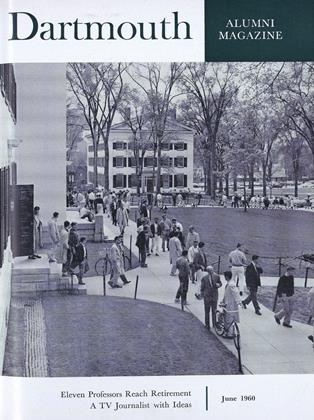On April 30, the 240-year Braintree, Mass., birthplace of General Sylvanus Thayer, soldier, technologist, and educator was dedicated as an historic shrine. At the ceremonies, Lt. General Garrison H. Davidson, present superintendent of the U. S. Military Academy, said, in part: "It has been a source of wonder to me that an individual who has done so much for our country is so little recognized outside of military circles."
Walt Berger ME'59 reports that on June 17 he will turn in his 2 /Lt. bars and return to civilian life with plans to attend Harvard Business School next fall. Walt was commissioned in the Corps of Engineers last December following duty assignments at Ft. Carson, Ft. Leonard Wood, Ft. Belvoir, and Ft. Sill.
Bob Butler '38 visited Hanover in the middle of April while on a trip with his two daughters, 15 and 16, to look over New England women's colleges. Bob reports that the Butler Bin Company has expanded its activities into the field of electronic controls.
We record with sadness the passing of Professor Harold J. Lockwood at Hartford, Conn., on April 15. Professor Lockwood was Professor of Electrical Engineering at Thayer School from 1921 to 1932 and held the same position at Manhattan College from 1938 to 1942. In 1943 he went to Trinity College as chairman of the Engineering Department where he was Hallden Professor of Engineering at the time of his death.
We have learned recently that Vin Burke EE'49 is Personnel Supervisor for the Construction-Engineering Division of Pacific Telephone at Los Angeles.
Leslie Tenn-Lyn CE'59 is working as site engineer for the Marley and Plant Construction Company in Jamaica. His duties include design, estimating and construction supervision. Leslie speaks glowingly of the Jamaican climate but confesses to a certain nostalgia for Hanover winters.
Shaw Cole '31 served as chairman of the Water Supply and Waste Disposal Session of the 1960 Nuclear Congress held in New York on April 8. An 8-hour delay on the New Haven-Hartford Railroad due to floods on the Connecticut River effectively prevented the writer from arriving in New York in time to attend this session.
The February issue of the Raymond Record is decorated with a photo of Ace Bailey '40, who is vice-president of the company in charge of heavy construction. The by-line with the photo quotes him as saying that he "is good at demolishing, but not so good at rebuilding."
On April 26 the Boston Branch of the Dartmouth Society of Engineers held their annual meeting. At this meeting, Dean Kimball spoke about the proposed reorientation of the Civil Engineering Curriculum as Environmental Engineering, as described in the May issue of the ALUMNI MAGAZINE. Those attending the meeting were: Paul Barnico ME'51, Nick Costes CE'51, John Minnich '29, Charlie Marshall ME'48, Ken Little CE'53, Charlie Main '39, John Hirst '39, Charlie Hitchcock '39, Carl Washburn '46, Bob Treat CE'50, Warren Daniell CE'50, Al Wilson '47, Dick Rice '44, Phil Jackson '44, Dick Tousley '42, Howard Wright '20, Russ Rice 'l6, Sid Beane '12, Ace Hall TT'56, Harlan Jessup TT'56, Dick Ellis '17, Al Doolittle '37, John Scanlon '34.
Thayer alumni may be interested to learn that the Engineering Science class of 1960 has the privilege and pleasure of taking a comprehensive examination in partial fulfillment of the requirements for the A.B. degree. The 1960 comprehensive examination is comprised of three parts required of all students and a fourth part which is optional for students seeking honors. The first part is an objective-type examination which is a survey of the essential material presented in the Engineering Science courses. This is followed by a three-hour examination testing ability to handle advanced problems in engineering. Following a one-day rest, or recovery period, the students are asked to write for three hours on topics deemed to be fundamental to a sound understanding of their work in Engineering Science. The last part, which is optional, is an oral examination to test their ability to think clearly on their feet. The first part of the examination has already been given and it is a pleasure to report that the class performance widely exceeded the expectations of both the faculty and the students.
 View Full Issue
View Full Issue
More From This Issue
EDWARD S. BROWN '35
-
 Article
ArticleThayer School
December 1953 By EDWARD S. BROWN '35 -
 Article
ArticleThayer School
MARCH 1959 By EDWARD S. BROWN '35 -
 Article
ArticleThayer School
October 1959 By EDWARD S. BROWN '35 -
 Article
ArticleThayer School
December 1959 By EDWARD S. BROWN '35 -
 Article
ArticleThayer School
February 1960 By EDWARD S. BROWN '35 -
 Article
ArticleThayer School
April 1960 By EDWARD S. BROWN '35













